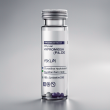
Prinomastat Hydrochloride 95 (HPLC) - MMP Inhibitor
ProcurenetShort description
Prinomastat Hydrochloride 95 (HPLC) – MMP Inhibitor
- Matrix metalloprotease (MMP) inhibitor
- Selectively inhibits MMPs 2, 3, 9, 13, and 14
- CAS: 192329-42-3
-
Procurenet Team Tshim Sha Tsui
Hong Kong 3 years
Description
Prinomastat Hydrochloride 95 (HPLC) - MMP Inhibitor
- Highly potent compound designed as a matrix metalloprotease (MMP) inhibitor
- Purity of >=95% confirmed through High Performance Liquid Chromatography (HPLC) analysis
- Reliable and effective solution for various research applications
- Contains key ingredients including Prinomastat hydrochloride (AG 3340)
Features
- High purity (>= 95%) as determined by HPLC analysis
- Effectively suppresses the activity of MMPs 2, 3, 9, 13, and 14
- Provides valuable insight into the roles and functions of MMPs
- Selective inhibition targeting specific MMPs for accurate investigation
- Known by various names including PZ0198, AG 3340 hydrochloride, AG-3340 hydrochloride, and AG3340 hydrochloride
Specifications
- Purity: >= 95% (HPLC)
- Chemical Formula: (S)-2, 2-Dimethyl-4-((p-(4-pyridyloxy)phenyl)sulfonyl)-3-thiomorpholinecarbohydroxamic acid hydrochloride
- CAS Number: 192329-42-3
Uses
Prinomastat Hydrochloride 95 (HPLC) is a highly potent compound designed specifically as a matrix metalloprotease (MMP) inhibitor. With a purity of >= 95% confirmed through High Performance Liquid Chromatography (HPLC) analysis, this hydrochloride form of Prinomastat is a reliable and effective solution for various research applications.
- Investigate MMP activity and its impact on various biological processes
- Study the role of MMPs in tissue remodeling, wound healing, and cancer metastasis
- Develop potential therapeutic strategies for MMP-associated diseases
- Explore the potential of MMP inhibitors in drug discovery and development
With Prinomastat hydrochloride 95 (HPLC), researchers can conveniently and reliably study the effects of MMP inhibition in a wide range of research areas, contributing to advancements in biomedical science and potential therapeutic interventions.

---MMP-Inhibito.png)



